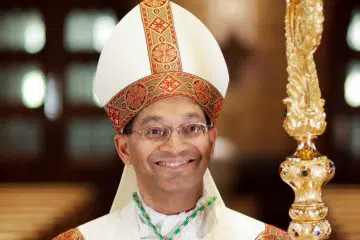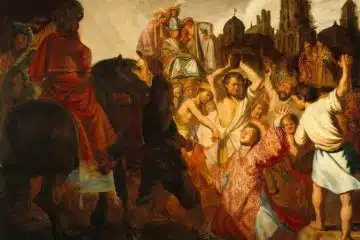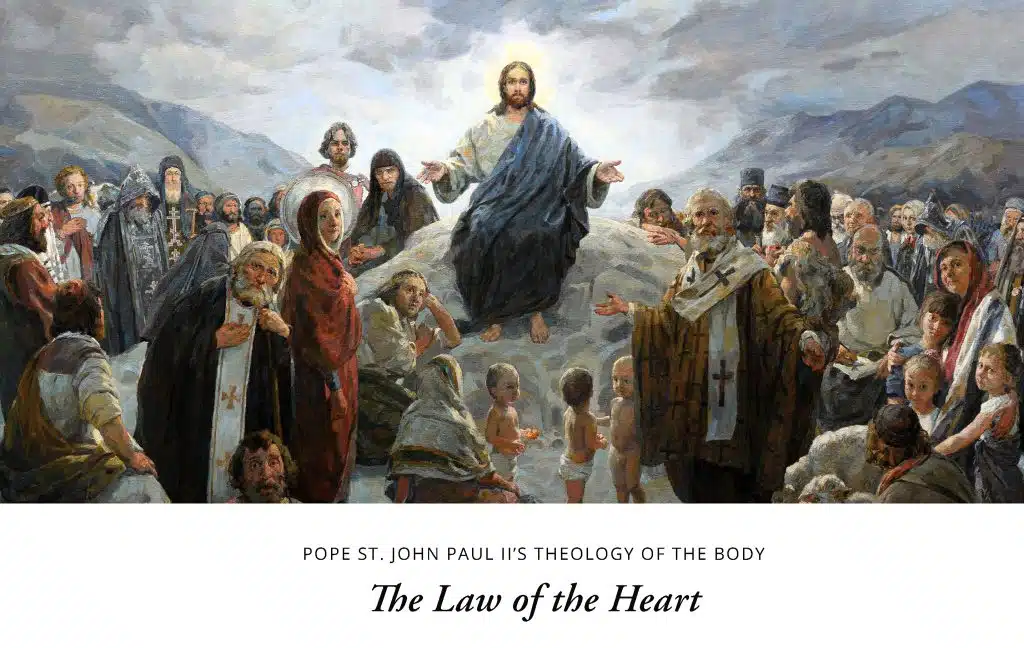The Law of the Heart
Note: This article is part of an ongoing series on Pope St. John Paul II’s “Theology of the Body” (TOB).
By taking on our human nature in the Incarnation, Jesus, the eternal Son of the Father, united himself intimately with us. He did this in order to save us from sin, to reveal the Father and His love to us, to give us an example of holiness to follow, and ultimately, to enable us to share in the divine life of the Blessed Trinity (CCC, 457-460). In Theology of the Body, Pope St. John Paul II was especially interested in the implications of our redemption in Christ, the New Law of the Gospel and our call to holiness for how we regard our bodies, our sexuality and how we relate with one another. To help us enter into his reflections, we first pondered the universal call to holiness and the purpose of the moral law. We saw that with the grace that Christ won for us—and continually supplies through His bride, the Church— sanctity is not only possible for each and every one of us, but is the standard of life for every Christian.
In the previous article, we reflected on the moral law’s purpose. At various times, we can experience suspicion, resentment or even embarrassment of Catholic moral teaching. However, if we have the eyes to see it, the moral law is actually an amazing gift of love given to us by our generous, loving Father. He desires us to enjoy our freedom and creativity in this life and has given us the moral law— expressed in its fullest form in Catholic moral teaching—so that we do not fall into the slavery of sin. He desires to help safeguard and enhance our freedom so that we can shape our lives in ways that truly befit our dignity as God’s sons and daughters and that lead us to eternal communion with Him. In this way, the moral law is actually centered on our happiness—both in this life and in eternity.
During His earthly ministry, Jesus brought the Old Law to fulfillment through His example and teaching. In doing so, He gave us the New Law of the Gospel, which “is the perfection here on earth of the divine law, natural and revealed.” It is “expressed particularly in the Sermon on the Mount” (CCC, 1965). There, the Lord repeatedly uses the form “you have heard that it was said … but I say to you …” (Mt. 5). To make His purpose absolutely clear, He prefaces these sayings with the statement, “Do not think that I have come to abolish the Law or the Prophets; I have not come to abolish them but to fulfill them” (Mt. 5:17).
Within these sayings in the Sermon on the Mount, our Lord shows us that the moral law is about more than just external actions. External actions and overt obedience are very important, but they mean little if they do not reflect the true attitudes of our heart. Our inner attitudes, intentions and desires matter just as much, if not more.
For example, Jesus teaches us that it is not enough for us to refrain from killing others. Rather, we must root out disordered anger, resentment and unforgiveness. Jesus calls us, His disciples, to a level of holiness that involves the whole person, even the depths of the heart. Thus, the New Law of the Gospel is truly a law of the heart. Through it, Jesus shows us that the Father loves us so much that He desires not mere slaves who robotically follow “the rules.” Rather, He longs for our hearts to be intimately united with Him so that we can be liberated from sinful attitudes and experience the “glorious freedom of the children of God” (Rom. 8:21).
Jesus calls all of us to continual conversion of heart. He invites us to look within and to discern where we need healing and conversion. Pope St. John Paul II saw this task as central to the Christian life and especially crucial for us to arrive at a mature, integrated sexuality whereby we can relate with one another in a way befitting human persons made in God’s image. He recognized that looking within to pursue deeper holiness is daunting. This is why he sought, in his first public remarks as pope, to encourage us: “Do not be afraid. Open wide the doors for Christ … Do not be afraid. Christ knows ‘what is in man.’ He alone knows it … He alone has words of life, yes, of eternal life.”
With Pope St. John Paul II as guide, let us delve deeply into the human heart, inviting the light of Christ to reveal all that needs to be purified.
 Dr. Andrew Sodergren, MTS, PSY.D is a Catholic psychologist and director of psychological services for Ruah Woods. He speaks on the integration of psychology and the Catholic faith. He and his wife, Ellie, have five children.
Dr. Andrew Sodergren, MTS, PSY.D is a Catholic psychologist and director of psychological services for Ruah Woods. He speaks on the integration of psychology and the Catholic faith. He and his wife, Ellie, have five children.
This article appeared in the November 2023 edition of The Catholic Telegraph Magazine. For your complimentary subscription, click here.














